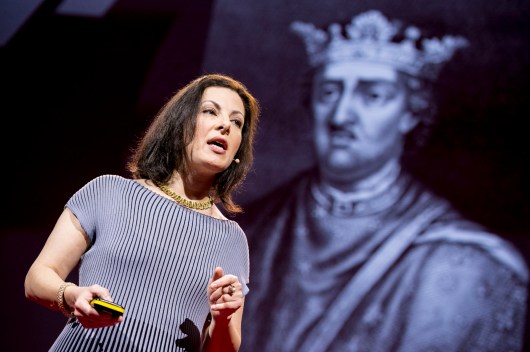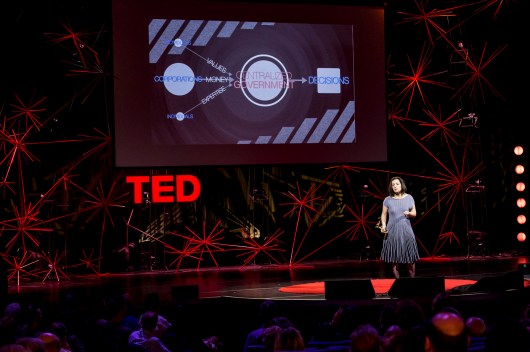As the US’s first Deputy CTO, Beth Noveck founded the White House Open Government Initiative, which developed administration policy on transparency, participation and collaboration. She starts her talk by reminding us that in the old days, the White House was literally an open house. At the beginning of the 19th century, John Quincy Adams met a local dentist who happened in to shake his hand. Adams promptly dismissed the Secretary of State, with whom he was meeting, and asked the dentist to remove an aching tooth.
“When I got to the White House in 2009, the White house was anything but open,” she says. Bomb blast curtains covered the windows; they were running Windows 2000. Social media was verboten. Noveck’s mandate: to change this system.
But how could she get government employees to be more open? How to get people to comment on laws before they were enacted? There was no precedent, she says. There was no technical way to do this. Not only that, many people even told her the idea might be illegal.
The system of government is out-of-date and inappropriate for our current world. “The smartest people always work for someone else,” she says. “We know expertise and intelligence is widely distributed and not limited to our institutions.” Yet for the most part, open is not a factor of our government institutions.
“We live in a Cambrian age of big data and social media,” she says. “We have this opportunity to redesign institutions that are quite recent.” After all, she asks. “What other sector of the economy, especially one as big as the public sector, does not seek to reinvent its business model on a regular basis?” Investment in innovation is useless without working to reinvent the institutions themselves.
Sure, it’s easy to blame this atrophy and lack of change on party politics. That, she acknowledges, is a perennial pastime. “But complain as we might, what can replace what we have today? What comes the day after the Arab Spring?”
Look at networks such as Facebook or Twitter. Facebook is an interesting example, where a mere 3,000 employees govern 900 million people. But privatized communities are not bottom-up democracies. They cannot replace government. “Friending someone on Facebook does not do the hard work of governance,” she says firmly.
Officials can learn something from such organizations, however. Open platforms and the explosion of apps sets a precedent for thinking about “opening up the API of government.” As Noveck says: “The next great superpower will be one to combine the hierarchy of the institution — because we need to retain public values and coordinate flow — with diversity, chaos and the excitement of networks.”
She goes so far as to hazard: This is more than evolution; this is revolution. She offers a few interesting experiments in governance that can act as precursor examples to contemplate. MKSS in Rrajasthan, India, painted government data on 100,000 village walls. Villagers helped to fill in the gap: Who’s on the payroll? Who died? This was civic engagement that saved real money. Or Ushahidi, created during the post-election riots in Kenya in 2008, which helps a community to crowdsource crisis mapping.
Or take rocker Jon Bon Jovi, who runs a soup kitchen in New Jersey for homeless veterans. In February, he worked with the White House to create scalable apps that will help the homeless and those who deliver services to them. The finalists were announced in June. Four months! In the bureaucratic world of yesteryear, Noveck quips, you’d barely have filled out the forms within four months.
There are economic benefits to open innovation work too. For instance, Sberbank, the oldest bank in Russia, started practicing crowdsourcing, and last year saved a billion dollars from its open innovation initiatives.
But, she is clear, this is not about transparent government. “Simply throwing data over the transom doesn’t change how government works. It doesn’t do anything to get anyone to do anything,” she says. That said, the open government revolution is hugely important. And it comes in two phases.
The first is opening up information for better decisions. Noveck tells us a story of teaching patent law in 2005. Back then, a single person in the US Patent Office had the power to make decisions about which patent applications would be granted, in effect allowing monopoly rights over an entire field of activity for 20 years. She and her students imagined a network that would connect institutions and scientists and allow for a better flow of information about innovation. Now, she announces to great applause, the US Patent Office is set to unveil total openness, meaning all patent applications will be open for people to assess and analyze as of this year.
The second phase is sharing decisionmaking power. Participatory budgeting is now practiced in Brazil, and starting up in Chicago. Russia has been using wikis to get citizens to write law. Once we start to see power over the core functions of government, we’re well on way to an open government revolution.
And there are many things we can do to get there, Noveck suggests. The way to start: create and curate more participatory opportunities. Like a hackathon, working together to build apps is an intelligent way to build both participation and great products.
We need to start with the youngest people. Yesterday we heard TEDTalks about biohacking and hacking plants with Arduino and how Mozilla Popcorn is getting people to make video websites, she reminds us: “When we start by teaching young people we live in a writable society where we have power to change communities, that’s when we really put ourselves on the pathway to the open government revolution.”
She ends with this exhortation:
“The last thing, the most important thing for us to do is demand this revolution. We don’t have words really to describe it yet. Equality, fairness in the traditional sense, are not great terms yet. They’re not fun or exciting enough to get us engaged in this tremendous opportunity that awaits us. If we want to see the hopeful, exciting kinds of innovations in clean energy and education and development, if we want to see those adopted and scaled, we must all participate. Open up institutions and let the nutrients flow throughout our culture to create open institutions, a stronger democracy, a better tomorrow.”
Photos: James Duncan Davidson


Comments (18)
Pingback: Anonymous
Pingback: Anonymous
Pingback: Ms. Noveck, I’m Demanding Open Government. Where Is It? | Livin' on the Hedge
Pingback: Open Ministry: People’s Insights Issue 46 | MSLGROUP BLOG
Pingback: People’s Insights Volume 1, Issue 46: Open Ministry | MSLGROUP India Social Hive
Pingback: People’s Insights Volume 1, Issue 46: Open Ministry | People's Lab
Pingback: Future of Engagement: #3 Collaborative Social Innovation | MSLGROUP BLOG
Pingback: #3 Collaborative Social Innovation: Ten Frontiers for the Future of Engagement | MSLGROUP India Social Hive
Pingback: Ten Frontiers for the Future of Engagement: #3 Collaborative Social Innovation | Gauravonomics
Pingback: #3 Collaborative Social Innovation: Ten Frontiers for the Future of Engagement | People's Lab
Pingback: The Open Government Revolution
Pingback: New OSS project: Solon Voting - cryptographically secure e-voting for delegated democracy platforms | OpenLife.cc
Pingback: What sectors might learn from each other « haideebell
Pingback: Beth Noveck on a More Open-Source Government « Microformats & the semanantic web
Pingback: Beth Noveck on a More Open-Source Government - semanticweb.com
Pingback: Wagner Today
Pingback: Jeux vidéos, consommation collaborative et menaces terroristes : compte rendu de la 3ème journée | TEDGlobal Edimbourg 2012